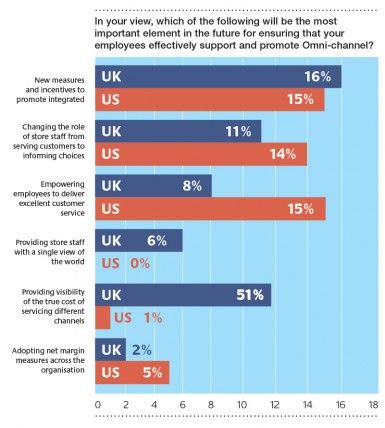The omni-channel revolution is well underway in the retail sector in both the UK and US. In fact, it is advancing at such a pace that the term itself is polarising the supply chain debate. Yet, whether the approach is expressed as “seamless retail”, “integrated retail” or similar, the principles remain the same and are dramatically altering the retail industry.
But there is something of a two-speed timeline between the UK’s largest retailers and their US counterparts, and transatlantic tensions reveal an interesting picture of strengths and weaknesses on both sides of the ocean.
UK LAGGING BEHIND CUSTOMERS AND US IN OMNI-CHANNEL
When it comes to development at its most basic level, the US retail sector would appear to be further ahead with 43 per cent of retailers having a fully integrated omni-channel approach compared with 27 per cent of UK retailers.
However, although the US is further advanced, both UK and US retailers agree the greatest overall benefits of going “omni” are an enhanced business operating model and increased sales.
A recent LCP Insight Study, entitled Omni-Channel: A UK v US Perspective, revealed that fulfilment and integrated IT systems are the most important business and operational capabilities in need of development to meet customer and market expectations.
In the US, these changes are already underway or will happen in the next year or two, while the majority of those in the UK think change will be needed in three to five years or more.
Motivation on each side of the Atlantic provides another clue to the different stages of omni-channel maturity:
- In the US, 27 per cent of retailers cited pre-defined return-on-investment targets as their motivation for investing in omni-channel, against just 16 per cent in the UK
- More than a third in the UK saw the simple “need to compete” as the key motivation.
The retailers’ agreement that the greatest overall benefits are an enhanced business model and increased sales clearly shows a major step forward from the perception that it is simply the supply chain’s response to demand from new sales channels to a driver for a wider change in corporate culture and adding direct value to the business.
Both UK and US retailers agree the greatest overall benefits of going ‘omni’ are an enhanced business operating model and increased sales
“With US retailers further advanced and taking a more holistic approach to going omni, they are able to identify operating cost-savings as well as stock availability improvements – so they can also identify a clearer return on investment,” says Stuart Higgins, retail partner at LCP Consulting.
NEW MEASURES AND INCENTIVES TO PROMOTE INTEGRATED THINKING
UK and US retailers agreed that developing new measures and incentives to promote integrated thinking was the most important element in ensuring employee support for an omni-culture.
However, in the US, this people-centric approach is more likely to be a theme that is carried through the integrated approach. For example, empowering employees to deliver excellent customer service or changing the role of store staff from simply serving customers to informing their choices, were both high on the US list.

LOOKING AHEAD – A TIGHT RACE FOR INTEGRATED EXCELLENCE
In essence, a picture is emerging of US retailers not only viewing the revolution as essential for success in a digitally enabled world, but also appearing to see a bigger, more holistic picture.
This involves controlling all elements of the supply chain, while understanding the entire customer journey – a balance between “front of house” and “back of house” while servicing the customer whatever, wherever and whenever the touchpoint.
This bigger-picture perspective is also reflected in US retailers’ approach to the culture change and motivation needed to encourage their staff to embrace the new approach.
Critically, there is a game-changer which the UK can exploit in speeding up its transition to a seamless supply environment – it is the carrier model. If retailers can recognise and maximise the potential that a nationwide carrier network offers, then a key component in the transformation is secure, removing an external distraction and allowing them to concentrate on re-aligning their internal business models and supply infrastructures.
“In our experience, regardless of cost, omni-channel is becoming the need-to-have model for the retail industry. It has almost reached the tipping-point of change or fail,” concludes Phil Streatfield, retail partner, LCP Consulting.
Contact LCP Consulting on 01442 872298 or e-mail [email protected] for more information on the following reports:
Omni-Channel: A UK v US Perspective
The Omni-Channel Revolution: Re-engineering the Retail Business
UK LAGGING BEHIND CUSTOMERS AND US IN OMNI-CHANNEL
NEW MEASURES AND INCENTIVES TO PROMOTE INTEGRATED THINKING

